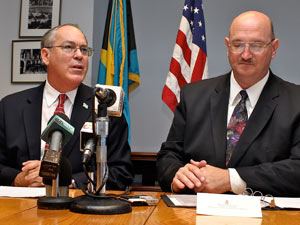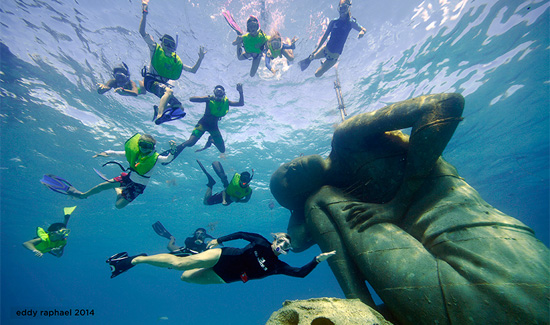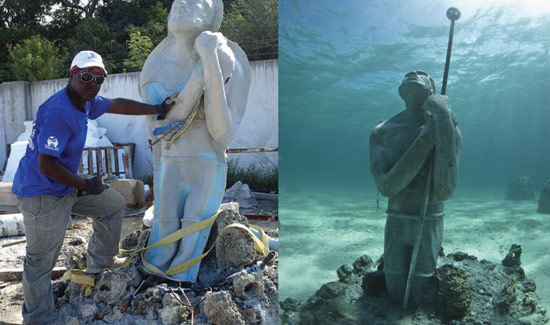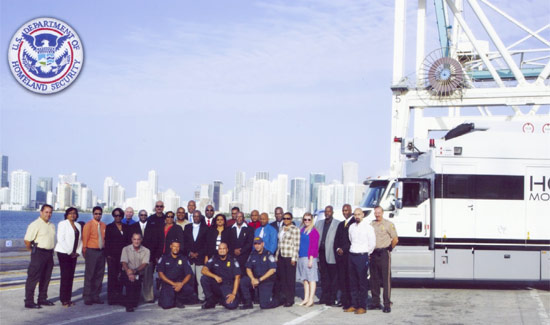
NASSAU, The Bahamas – The Bahamas and the United States have begun the process of official negotiations toward defining maritime boundaries between both countries.
The process started Thursday, April 26, 2012 during a meeting at the Ministry of Foreign Affairs where Deputy Prime Minister and Minister of Foreign Affairs the Hon. Brent Symonette and John Dinkelman, Charge’ d Affaires, Embassy of the United States of America, underscored the importance of coming to such an agreement.
“Achieving a negotiated and mutually beneficial agreement with our neighbour the USA is a priority for the Government of The Bahamas,” Mr. Symonette said.
He said both parties are assured that the issues discussed and advanced during the meeting will be based not only on core legal principles and rules, but will be framed within the context of good faith and mutual respect.
“The uniqueness of the relationship that exists between our two countries is evidenced in our close collaboration, particularly in the area of security and narcotics control,” Mr. Symonette said. “These mutually beneficial security based initiatives are reflected in the Comprehensive Maritime Agreement which was concluded between our two countries in 2001.”
The Bahamas was among the first countries in the world to permit US ship riders to exercise limited jurisdiction within its national territory.
It is envisioned that the deep and abiding relationship that has spanned the historical ties between both countries will augur well for the tone and tenor of these inaugural talks and future negotiations, Mr. Symonette said.
“The sea connects both countries as does our commitment to the rule of law and our mutual recognition of fundamental principles of the international legal principles governing the world’s oceans,” he said.
The United States has not yet signed on to the United Nations Convention on the Law of the Sea, Mr. Symonette noted, adding that The Bahamas looks forward to the day when that country becomes a States Party.
“For The Bahamas, the delimitation of its maritime boundaries is of paramount importance as boundaries express in concrete terms the space in which a country has the right to fully exercise its sovereignty,” he said.
The need for this critical “self-defining” action was articulated in 1972 prior to independence when the government presented a White Paper to Parliament, emphasising the importance of establishing boundaries for The Bahamas.
In this regard, The Bahamas is actively pursuing a Maritime Delimitation Boundary Agreements with its neighbours.
To date, The Bahamas has completed agreement with the Republic of Cuba, and has initiated talks with the United Kingdom in respect of the Turks and Caicos Islands. However these talks were suspended until the settlement of internal issues in that British territory.
“A defined maritime border between The Bahamas and the United States of America will allow for more effective law enforcement of The Bahamas’ maritime area, including a more efficacious management of fisheries resources and further advancement towards mitigating environmental degradation,” Mr. Symonette said.
Additionally, a maritime border will give legal certainty to both countries, clarifying the extent to which The Bahamas is able to harness the future potential of its maritime resources.
“A future maritime border between our two countries can only facilitate, further the cooperation between The Bahamas and the United States on maritime issues, subsequently contributing to the maintenance of peace, security and economic advancement,” he said.
US Charge’ d’ Affaires John Dinkelman said while the negotiating teams of both countries bring “extraordinary experience, technical expertise and intellectual skills to the negotiations, perhaps the most valuable asset is the foundation of friendship and mutual respect.
By LINDSAY THOMPSON
BAHAMAS INFORMATION SERVICES



